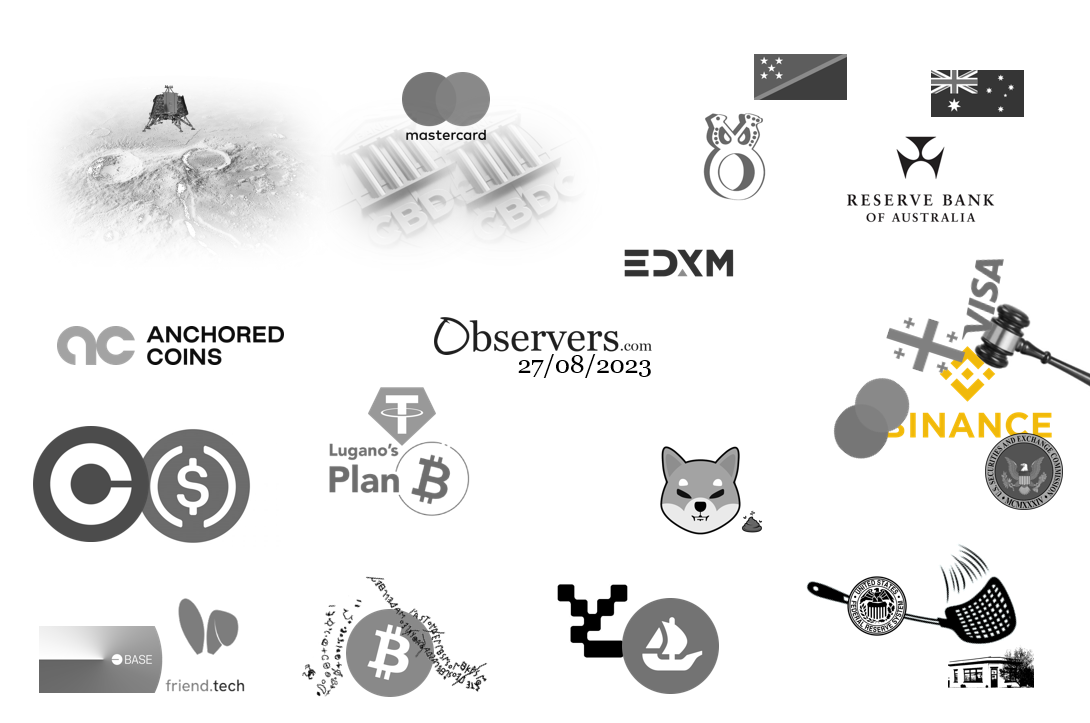
Just two weeks ago we quipped 'wen moon?' as Virgin Galactic launched the world's first tourist space flight.
Well it seems India's response to that was, "Hold my beer," as on Wednesday it became only the fourth nation to achieve a lunar landing, and the first to put a spacecraft down near the moon's south pole.
No such luck for North Korea, whose second attempt to launch a spy satellite, again ended in failure... But who reached for the stars and who crash-landed into the ocean in the crypto world this week? Read on to find out.
Kicking off with CBDCs: Mastercard brought together an industry group including Ripple, Consensys and Fireblocks this week, in a vain attempt to ensure that it stays relevant when digital payments no longer need to pay the extortionate fees it charges for using its network.
Meanwhile, Australia has released positive findings from its CBDC pilot program (although any final decision is noted to still be years away), and even the tiny Solomon Islands is getting in on the CBDC feasibility game with Japanese support.
A short hop across to stablecoins next, where a Swiss company headed by a former modeling agent and Singaporean MP launched both euro- and Swiss franc-pegged tokens on Ethereum and Binance smart chain. Across the pond, the USDC Stablecoin Consortium was dissolved, when founder-member Coinbase bought a direct stake in the only other member (and co-founder) Circle.
Sticking with Coinbase, the exchange's L2 chain Base saw another 'questionable' project go viral, as social platform Friend.tech purportedly had people willing to splash $2,000 just to chat with an influencer. We also unpicked what went wrong for Shibarium, which seemed to be a fairly solid (if meme-y) project, although suffered from a rather 'questionable' launch.
The source of Bitcoin's meme-tokens and NFTs appears to have fallen from grace, as trading volume in Ordinals has fallen 97% from its May peak. Also falling from grace was the OpenSea NFT market, which saw Bored Ape producer Yuga walk away from the platform over the removal of enforced creator royalties.
Wall Street-backed crypto exchange EDX Markets continued on its path to creating a sanitized 'safe space' for institutions to dip their toes into the murky waters of crypto while minimizing the risk of ending up with a nasty rash. And over in the real world, Tether continued its path to bring bricks-and-mortar crypto retail payments into the mainstream, via its participation in the Swiss city of Lugano's Plan ₿ initiative.
Continuing its crypto-banking crackdown, the U.S. Federal Reserve shut down the tiny Farmington Bank in Washington State. Farmington flew too close to the sun last year and accepted investment from FTX-linked Alameda Research, possibly in exchange for the abuse of its banking license as a potential stablecoin issuer.
Finally, it wouldn't be a Sunday Review without a roundup of Binance's weekly misdeeds. The world's biggest crypto exchange has allegedly been finding creative ways to flaunt sanctions and continue servicing the Russian market. Unrelated to this (probably), is news that Binance will be closing its office in the European nation of Georgia, as it couldn't secure a license as a Virtual Asset Service Provider.
Perhaps the regulatory regime is more favorable on the moon?

